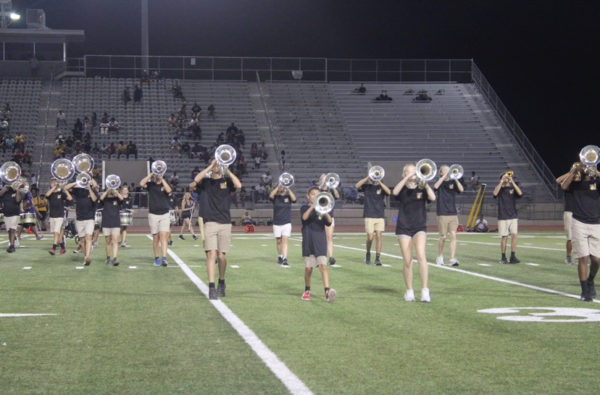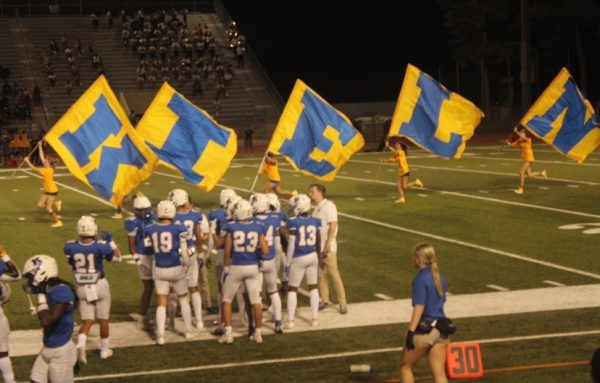KHS administrators take Ice Bucket Challenge
When people think of the ALS Ice Bucket Challenge, they think that it’s simply dumping freezing cold water on their heads because they got nominated. Others think of it as a way to get noticed, and many think that it is truly a worthy cause that brings awareness to ALS. Several celebrities have supported the cause; even principal Larry Whitehead and several administrators have participated.
“It’s a great cause and it was a great opportunity to do in front of students, to let my hair down, you could say,” Whitehead said.
Seeing the millions of people taking the Ice Bucket Challenge has helped those with ALS see that they are not alone, as well as helped those without ALS to see the devastating effects of the disease. According to HOSA president, senior Ashna Dhingra, the challenge has brought people together for this cause like never before.
“I think that the challenge helps people with ALS in the way that it provides a sense of community awareness and moral support,” said Dhingra.
Amyotrophic lateral sclerosis, or ALS, is a debilitating disease that affects the motor neurons in the brain which controls voluntary muscle movement. The beginning symptoms (stiff muscles, cramps, muscle weakness, or difficulty in speaking or swallowing) are often ignored because of their subtlety. Awareness for this disease, which has been very little as opposed to other diseases, could teach people the symptoms, so the several thousands of people who have ALS could receive earlier treatment.
“The Ice Bucket Challenge helps the cause, no question,” Whitehead said. “I think it’ll help with long-term research. I don’t know if the disease will ever be fully cured, but research can slow it down. Like with many types of cancer, we can now slow it down or cure it.”
Before the Ice Bucket Challenge, many people had never heard of such a disease, and if they had, it was either called Lou Gehrig’s disease, or it didn’t seem as important as other diseases such as breast cancer, leukemia, or Alzheimer’s.
“You hear the famous baseball name Lou Gehrig. Most people call it, I guess, Lou Gehrig’s disease,” said assistant principal Alicia Eichhorn. “I think with the availability of the electronic medium, people are able to see the deteriorating effects and what it does, but until this point, it was something less known.”
Critics of the Ice Bucket Challenge have states that it doesn’t truly help raise money for ALS associations and foundations, that it is simply a way for people to avoid donating. However, in a single month, the ALS Association received about $100.9 million, compared to the $2.8 million that was raised at the same time last year. This amount of funds for the ALS Association is due to the fact that people are not only performing the challenge for the Internet, but also donating what they can.
“Different people send in different amounts; I think that’s in addition to the cause and accepting the challenge,” said Eichhorn. “It went viral so quickly. I think that what happens is, without communicating, some people perceive accepting the challenge itself as being dismissive of donating to the cause, and that’s not the case. Not only do you take the challenge, but at the same time you make an effort to make the donation.”
The challenge has been around for a couple of years, but it only became viral this past July. So far, over two million videos have been posted online of people performing the challenge. This viral phenomena has reached fame because of the attention it receives on social media sites. It’s a simple way for people to feel as if they’ve done something worthwhile for a good cause.
“I think that the challenge is viral because it’s an interesting and creative way to promote awareness for ALS in the community,” said Dhingra. “It’s an encouraging way to get people to support the cause and watch their efforts spread across social media.”
The downside to being viral is that the Ice Bucket Challenge has begun to fade away into another fad. People won’t forget about it though. Seeing the support for ALS research has touched too many hearts to be forgotten.
“Unfortunately, the challenge has already started cooling off,” said Whitehead, “but I hope that the cause won’t get lost after the challenge stops.”
Now, people are aware of ALS and they know what it is. People have made contributions, people have pushed it along, and maybe people will remember to constantly make a difference.
“I think that the Ice Bucket Challenge itself will continue, but I don’t know if it would be as well documented as it continues to go on,” said Eichhorn. “I think you can still work towards taking the challenge and making donations and better investigate and understand the research behind the cause. It’s certainly a cause worth fighting for. However, I don’t think it should be pigeon-holed to a certain time. I think it should be ongoing and always at the forefront of our thoughts.”













